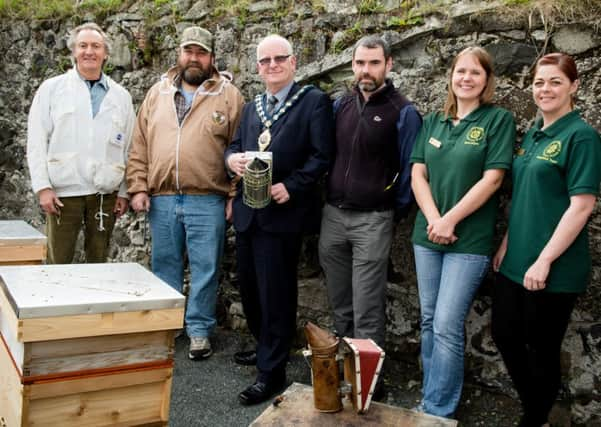Carnfunnock Country Park adopts bee colony


Working in partnership with the East Antrim Bee Keepers Association (EABKA), Mid and East Antrim Borough Council believes the move will make a significant contribution to biodiversity in the Borough.
Councillor Billy Ashe, Mayor of Mid and East Antrim Borough said: “The introduction of bee hives and promotion of local honey bees within Carnfunnock Country Park will significantly contribute to the conservation of biodiversity in the Mid and East Antrim Area.”
Advertisement
Hide AdAdvertisement
Hide Ad“Bees not only pollinate crops, they also help maintain the diversity of wildflowers we have, and the Carnfunnock bees will help maintain some of the spectacular wildflowers we have in the Borough.
“The influence of honey bees is much greater than just producing honey,” Cllr Ashe continued.
“Bees and other pollinators have a positive effect on birds and mammals that rely on the fruits and seeds produced by our native plants, and they promote other insects, including those beneficial ones that attack crop pests.
“Bees are an immediately recognisable feature of flower rich areas, and by protecting and promoting bees and their habitats, we’re not only protecting them but our wider biodiversity as well,” he said.
Advertisement
Hide AdAdvertisement
Hide AdRev Stephen Robinson, Secretary of the East Antrim Bee Keepers Association, said the move is important for biodiversity and also that the public have nothing to fear from these creatures: “The bees we’re introducing are an East Antrim-bred line of apis melifera melifera (Native Irish Honeybee) and are a very docile strain.
“As Irish pollinators are in decline, it’s important we take measures to address this and avoid consequences for our food sustainability, as well as local biodiversity.”
“East Antrim Beekeepers Association welcomes this biodiversity partnership with Mid and East Antrim Borough Council and hopes the Carnfunnock Apiary will be the first of many strategically placed, managed honeybee colonies on sites within the Council area.”
(CAPTION)
Rev Stephen Robinson, Secretary of the East Antrim Bee Keepers Association (EABKA) is pictured with EABKA colleagues, staff from Carnfunnock and the Mayor Councillor Billy Ashe as he prepares to meet the Native Irish Honeybees.
Advertisement
Hide AdAdvertisement
Hide AdIn the last year, 14.5% of honey bee colonies have been lost nationally, twice the level needed to sustain the population.
Honey bees are threatened by multiple diseases, parasitic mites, the implications of climate change and lack of diverse habitats for their food supply.
The number of managed honey bee colonies declined by 53% between 1985 and 2005, and meadowlands across the country have dropped by a staggering 97% since the 1930s. A lot of farmland is now “green desert” because of the loss of wildflower verge and hedgerows as bees can’t forage on grassland.
Today, there are no ‘wild’ colonies left in Northern Ireland. Any swarms that appear now are from managed stocks and if left in the wild will perish within 1-2 years due to disease so it’s very important that new managed stocks are introduced.
Advertisement
Hide AdAdvertisement
Hide AdEABKA is one of the oldest bee keeping associations in Northern Ireland (1941) with members ranging from teenagers to elderly men and women, keeping bees across East Antrim from Glenarm to Greenisland.
EABKA meets the third Thursday of the month in Ballycarry Community Centre at 8pm and new members are always welcome.